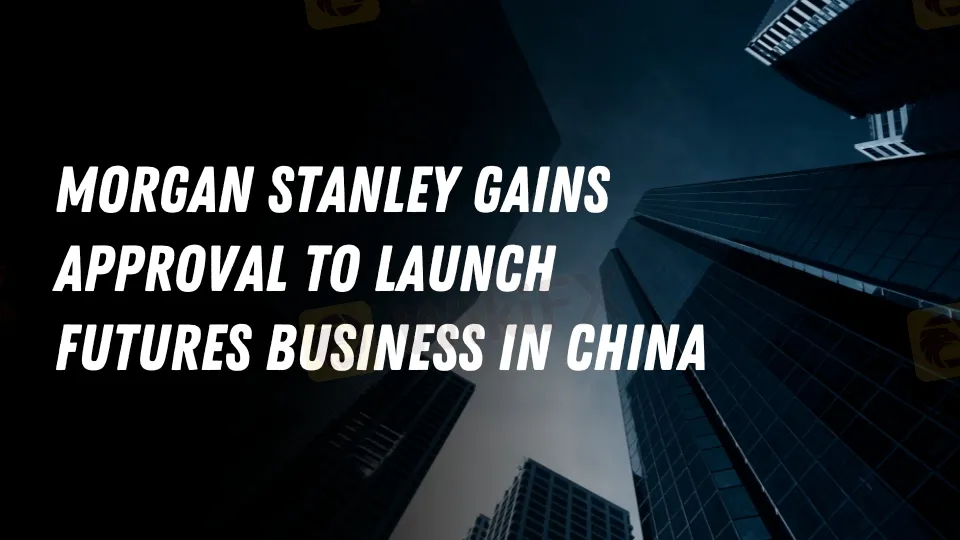Morgan Stanley Gains Approval to Launch Futures Business in China
Abstract:Morgan Stanley secures regulatory approval to enter China's futures market, expanding its presence and joining J.P. Morgan in the rapidly growing derivatives sector.

Morgan Stanley has secured regulatory approval to launch a futures business in China, marking a significant step forward for the American bank in one of the world‘s most rapidly expanding financial markets. The China Securities Regulatory Commission (CSRC) granted Morgan Stanley’s new entity, Morgan Stanley Futures (China), an official license, allowing it to offer services to both domestic clients and qualified offshore investors.
A spokesperson from Morgan Stanley stated, “We will continue to work closely with relevant regulators and futures exchanges and look forward to launching the business soon,” signaling the firm‘s commitment to working in alignment with China’s regulatory framework as it prepares to engage with this lucrative market.
The move positions Morgan Stanley as the second major U.S. bank to establish a foothold in China‘s futures market, following J.P. Morgan’s entry in 2020. China's futures trading sector has been expanding, with trading volumes skyrocketing to 568 trillion yuan ($80 trillion) in 2023, marking a 6% year-over-year increase. This surge in trading volume reflects the growing interest among domestic and international investors in Chinas financial markets, with the country progressively opening its doors to foreign investment.

Morgan Stanley‘s venture follows a broader trend of U.S. financial firms ramping up their presence in China. In recent years, China has introduced reforms to allow foreign banks greater access to its markets, including lifting ownership restrictions on securities ventures. In 2020, Goldman Sachs was granted permission to increase its holdings in its Beijing-based joint venture, Goldman Sachs Gao Hua Securities, to full ownership. UBS paved the way for these foreign investments, becoming the first foreign-controlled brokerage allowed to raise its stake in a local joint venture under China’s reformed ownership laws.
The CSRC‘s decision to grant Morgan Stanley entry into China’s futures market underscores the nation‘s commitment to expanding financial ties with foreign entities. By enabling firms like Morgan Stanley to establish futures businesses domestically, China aims to attract foreign capital and expertise, further integrating its financial markets with the global economy. As the second-largest economy, China’s incremental financial sector reforms signal opportunities for other global banks that seek to tap into its extensive economic potential.
The expansion into the Chinese market is not without challenges. Navigating local regulations, aligning with government priorities, and managing the inherent risks of the derivatives market require careful planning and adaptability. However, with China's financial sector continuing to evolve, foreign financial institutions like Morgan Stanley have much to gain.
Final Thoughts
Morgan Stanley‘s entry into China’s futures market signals a new era of collaboration and growth opportunities for international financial firms in the region. With the rapid expansion of Chinas financial sector, major U.S. banks are well-positioned to bring their expertise into a promising yet complex market, setting the stage for a more interconnected global financial landscape.

Read more

Day Trading Guide: Key Considerations
How does day trading balance freedom and precision in fast-moving markets? Learn key strategies to navigate risks and seize intraday opportunities effectively.

What Determines Currency Prices?
The price of currency directly impacts investor returns. Understanding the underlying causes of currency fluctuations can help investors make more informed decisions in the foreign exchange market.

AvaTrade Launches Advanced Automated Trading Tools AvaSocial and DupliTrade
AvaTrade launches enhanced automated trading solutions, featuring AvaSocial and DupliTrade for seamless, emotion-free trading. Explore cutting-edge tools today!

Tether Reacts to MiCA Regulations as Crypto.com Delists USDt in Europe
Tether criticizes MiCA-triggered delistings in Europe, warning of market risks. Crypto.com removes USDt and 9 other tokens to comply with EU crypto regulations.
WikiFX Broker
Latest News
SquaredFinancial offers Trump & Melania meme coins
What is the Best Time to Trade Forex?
Win Rewards & Celebrate Lunar NY with JustMarkets
BBC World Service to axe 130 jobs in bid to save £6m
Crypto.com Delists USDT and 9 Tokens to Comply with MiCA Regulations
AI Fraud Awareness Campaign: "We're Not All F**ked"
How to Use Financial News for Forex Trading?
Fake ‘cyber fraud online complaint’ website Exposed!
Day Trading Guide: Key Considerations
GMO-Z com Securities Thailand to Cease Operations in 2025
Rate Calc


